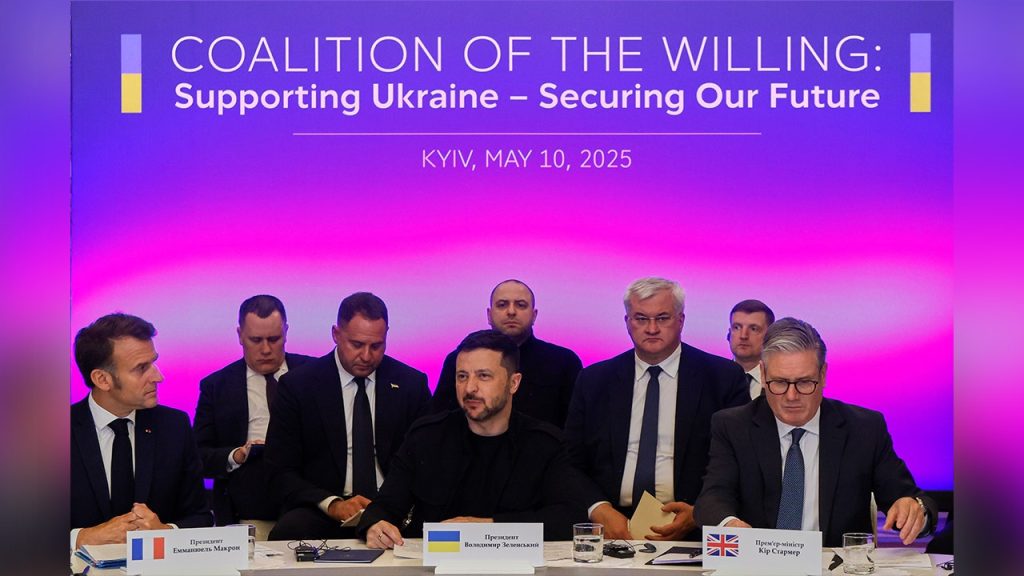In a pivotal display of solidarity, leaders from France, the United Kingdom, Germany, and Poland convened in Kyiv to demand a 30-day unconditional ceasefire from Russia’s President Vladimir Putin. This coordinated effort, which comes as tensions continue to escalate amidst ongoing hostilities, aims not only to halt the violence but also to pave the way for peace talks after over three years of war. The leaders emphasized their commitment to strengthening Ukraine’s military capabilities and signaled that failure to comply with the ceasefire would result in increased sanctions against Moscow.
| Article Subheadings |
|---|
| 1) European Leaders Unite for Ceasefire Initiative |
| 2) Details of the Proposed Ceasefire |
| 3) The Role of the United States |
| 4) Impact of the Ongoing Conflict |
| 5) Future Prospects for Peace |
European Leaders Unite for Ceasefire Initiative
On Saturday, leaders from four key European nations—France, the United Kingdom, Germany, and Poland—gathered in the Ukrainian capital to advocate for a proposed unconditional 30-day ceasefire with Russia. Ukrainian President Volodymyr Zelenskyy joined the coalition, which aims to bolster Ukraine’s defensive capabilities and achieve a peaceful resolution to the ongoing war. The leaders underscored their collective resolve to escalate pressure on the Kremlin should the proposal be ignored, reflecting a significant shift in European security dynamics.
Details of the Proposed Ceasefire
The proposed ceasefire is set to begin on Monday, calling for a comprehensive halt to all military operations across land, air, and sea. Commenting on the joint initiative, Ukrainian Foreign Minister Andrii Sybiha remarked that Kyiv and its allies are prepared for a full ceasefire, emphasizing that it is essential for facilitating sustainable peace talks. The leaders stipulated that if President Putin fails to comply, unprecedented sanctions targeting Russia’s energy and banking sectors will be enforced.
The Role of the United States
The proposal has received backing from U.S. President Donald Trump, who was briefed on the matter earlier in the day. The French President Emmanuel Macron indicated that the United States would take the lead in monitoring the ceasefire, supported by an alliance of European countries. Macron hinted at the potential for massive coordinated sanctions among Europeans and Americans if Russia does not adhere to the ceasefire, thereby highlighting the importance of transatlantic cooperation in addressing security challenges arising from the conflict.
Impact of the Ongoing Conflict
This latest round of diplomatic efforts comes amidst ongoing violence in Ukraine, where reports indicate that Russia has repeatedly violated previous ceasefire agreements. In a devastating demonstration of this continuing conflict, local authorities in Ukraine’s northern Sumy region reported recent shelling incidents that resulted in civilian casualties. The atmosphere of uncertainty is further exacerbated by Russia’s unyielding military campaigns, which have included indiscriminate attacks on civilian infrastructure, raising significant international concerns regarding humanitarian violations.
Future Prospects for Peace
Despite the bleak backdrop of ongoing hostilities, there remains a glimmer of hope for a diplomatic resolution. Officials, including retired U.S. Army Lt. Gen. Keith Kellogg, have suggested that a comprehensive ceasefire could initiate the pathway to ending what has been characterized as Europe’s largest and most protracted conflict since World War II. However, skepticism looms as both sides appear entrenched in their positions, with Ukraine’s partnership with its European allies becoming increasingly critical in shaping the continent’s security landscape.
| No. | Key Points |
|---|---|
| 1 | European leaders demand an unconditional 30-day ceasefire from Russia. |
| 2 | The proposed ceasefire is supported by U.S. President Donald Trump. |
| 3 | Increased sanctions against Russia are threatened if the ceasefire is ignored. |
| 4 | The ongoing conflict has resulted in civilian casualties and widespread destruction. |
| 5 | Future peace prospects hinge on military support from European allies. |
Summary
The ongoing conflict in Ukraine has reached a critical juncture as European leaders unite to propose an unconditional ceasefire and threaten sanctions against Russia. This initiative aims to halt violence and create conditions for peace talks, highlighting the importance of international collaboration in ensuring regional security. The situation remains complex and fluid, with continued military actions and diplomatic efforts influencing the path toward potential resolution.
Frequently Asked Questions
Question: What is the significance of the proposed ceasefire?
The proposed ceasefire aims to halt hostilities for 30 days and create a stable environment for peace negotiations, crucial for resolving the prolonged conflict in Ukraine.
Question: How has the United States influenced the ceasefire proposal?
The United States, under President Donald Trump, has endorsed the ceasefire proposal, agreeing to monitor the situation and potentially support sanctions against Russia.
Question: What actions could escalate tensions further?
Failure to adhere to the ceasefire by Russia could lead to heightened military responses and significant economic sanctions aimed at crippling Russia’s energy and banking sectors.
